INSULIN POWDER INHALER - ORAL
PHONETIC PRONUNCIATION: (IN-su-lin)
COMMON BRAND NAME(S): Afrezza
GENERIC NAME(S): insulin regular, human
Uses
USES: Inhaled insulin powder is used with a proper diet and exercise program to control high blood sugar in people with diabetes. Controlling high blood sugar helps prevent kidney damage, blindness, nerve problems, loss of limbs, and sexual function problems. Proper control of diabetes may also lessen your risk of a heart attack or stroke. This man-made insulin product is the same as human insulin. It replaces the insulin that your body would normally make. It is a short-acting insulin. It works by helping blood sugar (glucose) get into cells so your body can use it for energy. This product is absorbed into the blood through your lungs. It starts working faster and lasts for a shorter time than regular insulin injected under the skin. It is usually used in combination with a medium- or long-acting insulin product. This medication may also be used alone or with other oral diabetes drugs (such as metformin).
How to use INSULIN POWDER INHALER - ORAL
HOW TO USE: Read the Medication Guide and Instructions for Use Leaflet provided by your pharmacist before you start using inhaled insulin and each time you get a refill. Follow the illustrated directions for the proper use of this medication. If you have any questions, ask your doctor, diabetes educator, or pharmacist. This medication comes in cartridges in a blister package. Do not try to open the cartridges. The inhaler opens the blister/cartridge containing the insulin powder, allowing the insulin to be inhaled. Bring the medication and inhaler to room temperature before using. Follow your doctor's directions carefully. Inhale this medication by mouth at the beginning of a meal as directed by your doctor. Because inhaled insulin is fast-acting, not eating immediately after inhaling a dose of this insulin may lead to low blood sugar. The dosage is based on your medical condition and response to treatment. Do not change brands or types of insulin without directions on how to do so from your doctor. Use this medication regularly to get the most benefit from it. To help you remember, use it at the same times each day. Check your blood sugar regularly as directed by your doctor. Keep track of your results and share them with your doctor. This is very important in order to determine the correct insulin dose. Tell your doctor if your condition does not improve or if it worsens (your blood sugar is too high or too low).
Side Effects
Precautions
Interactions
Overdose
Images
Reviews
Faq for INSULIN POWDER INHALER - ORAL
An insulin powder inhaler oral is a device used to deliver insulin medication through the mouth into the lungs. It utilizes a dry powder form of insulin that is inhaled and absorbed into the bloodstream, providing a non-invasive alternative to traditional insulin injections.
The insulin powder inhaler oral works by using a small handheld device that releases a fine mist of powdered insulin. When inhaled, the insulin particles enter the lungs, where they are absorbed into the bloodstream. From there, the insulin can regulate blood sugar levels just like injectable insulin.
No, an insulin powder inhaler oral is only suitable for people with type 1 or type 2 diabetes who require insulin therapy. It is not appropriate for gestational diabetes or other forms of diabetes that do not require insulin.
Some advantages of using an insulin powder inhaler oral include avoiding needle injections, faster absorption of insulin into the bloodstream, and greater flexibility in dosing. It can also help reduce the fear or discomfort associated with injections for individuals with a fear of needles.
Common side effects of using an insulin powder inhaler oral may include coughing, throat irritation, or mild respiratory symptoms. However, it is important to discuss potential risks and side effects with a healthcare professional before using this device.
To use an insulin powder inhaler oral, the user must insert a pre-measured insulin cartridge into the device. They then inhale deeply, delivering the powdered insulin into their lungs. Specific instructions may vary, so it is essential to read and follow the manufacturer's guidelines.
No, an insulin powder inhaler oral is not meant to replace all insulin injections. It may be used as an alternative to mealtime or bolus insulin injections but not as a replacement for long-acting insulin. The dosage and usage should be discussed with a healthcare provider.
Clinical studies have shown that an insulin powder inhaler oral can effectively manage blood sugar levels in people with diabetes. However, individual responses can vary, and it is crucial to work closely with a healthcare provider to determine the appropriate dosing and ensure optimal glycemic control.
Insurance coverage for an insulin powder inhaler oral may vary depending on the insurance provider and specific plan. It is recommended to contact the insurance company or speak with a pharmacist to determine coverage eligibility and potential out-of-pocket costs.
Warning
WARNING: This medication can cause trouble breathing in people with long-term (chronic) lung disease (such as asthma, chronic obstructive pulmonary disease-COPD). This medication should not be used by people with chronic lung problems. Tell your doctor right away if you have trouble breathing, shortness of breath, persistent cough, or wheezing. Your doctor will check your lung function before you start using this medication. (See also Notes section.)
Disclaimer
IMPORTANT: HOW TO USE THIS INFORMATION: This is a summary and does NOT have all possible information about this product. This information does not assure that this product is safe, effective, or appropriate for you. This information is not individual medical advice and does not substitute for the advice of your health care professional. Always ask your health care professional for complete information about this product and your specific health needs.
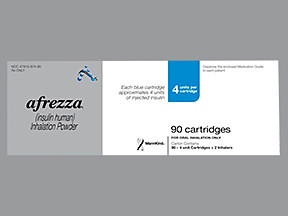
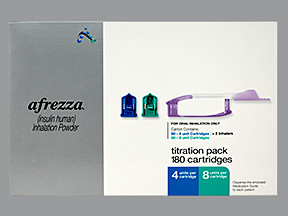
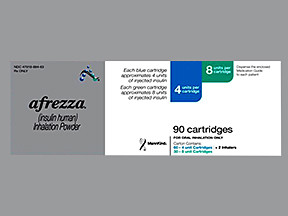
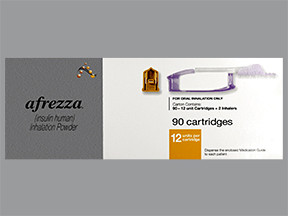
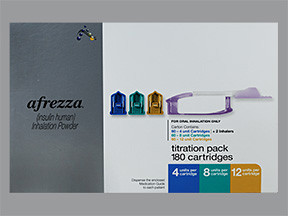
No Reviews Yet